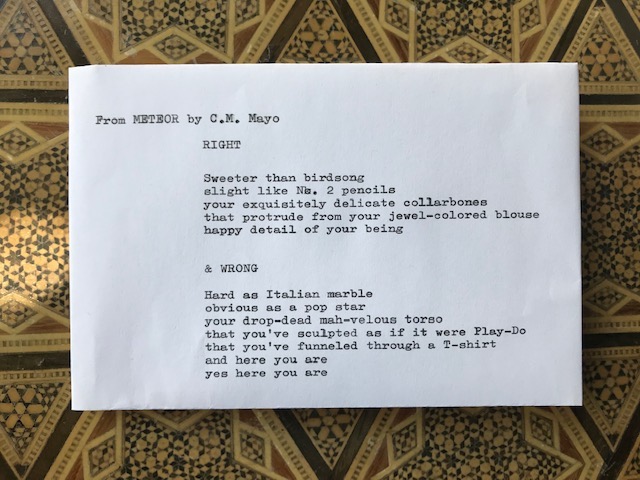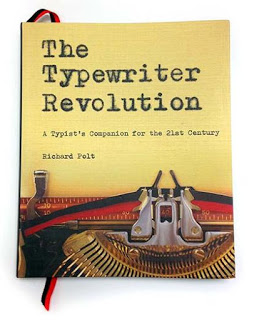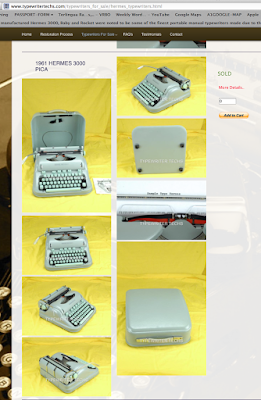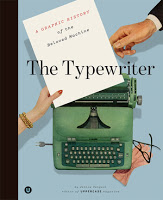
“[A]fter I started collecting typewriters in 1994, I rediscovered the pleasure of using them once in a while. My desire to use them more often led me to start “typecasting” in 2010—writing posts on a typewriter, then scanning and uploading them to a blog. It was a great decision. It connected me to the typosphere (typewriter bloggers around the world), and opened my eyes to the many uses these machines have today.”— Richard Polt
This blog posts on Mondays. Fourth Mondays of the month I devote to a Q & A with a fellow writer.
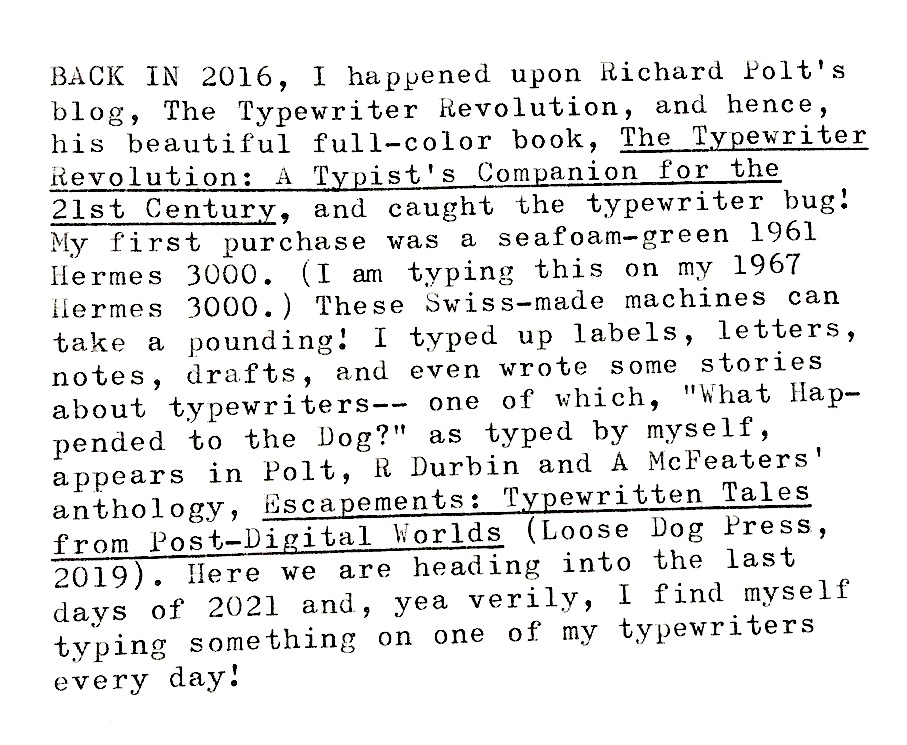
So, dear writerly readers, it is a delight and an honor to present you this month’s Q & A with none other than Richard Polt.
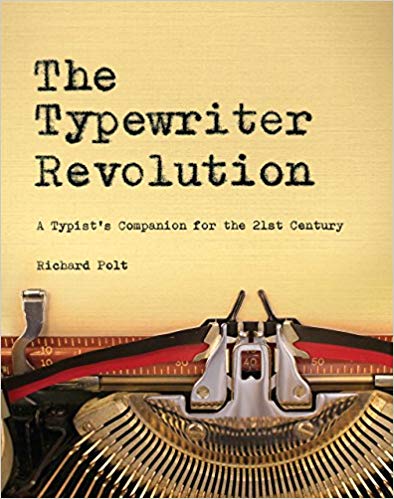
From The Typewriter Revolution’s catalog copy:
“Why a typewriter now? How do you find a good typewriter? How do you take care of it? The Typewriter Revolution has the answers.
“What do thousands of writers, makers, kids, poets, artists, steampunks, and hipsters have in common? They love typewriters—the magical, mechanical contraptions that are enjoying a surprising second life in the 21st century. The Typewriter Revolution documents the movement and provides practical advice on how to choose a typewriter, use it, and care for it—from National Novel Writing Month to letter-writing socials, from type-ins to customized typewriters.”
This is all a little more serious than it might appear, however. Richard Polt is a professor of Philosophy at Xavier University and the author of several works about the philosophy of Martin Heidegger, most recently, Time and Trauma: Thinking Through Heidegger in the Thirties. Heidegger is perhaps best known for his essay, “The Question Concerning Technology,” which first appeared in print in 1954.
*

C.M. MAYO: What prompted you to start using a typewriter?
RICHARD POLT: I took a typing class in school when I was 11 years old, in 1976, and my father soon found a 1937 Remington Noiseless no. 7 for me at a yard sale. I used that Remington for school, college, and grad school until I got a Mac in 1988. Then there was a period of several years when I didn’t even consider using a typewriter again. But after I started collecting typewriters in 1994, I rediscovered the pleasure of using them once in a while. My desire to use them more often led me to start “typecasting” in 2010—writing posts on a typewriter, then scanning and uploading them to a blog. It was a great decision. It connected me to the typosphere (typewriter bloggers around the world), and opened my eyes to the many uses these machines have today.
C.M. MAYO: What sorts of things do you use your typewriter to type?
RICHARD POLT: Brainstorms, fiction, poetry, letters, comments on students’ papers, blog posts.
C.M. MAYO: Which model is your go-to typewriter?
RICHARD POLT: I still love my first typewriter, the Remington Noiseless no. 7; it’s next to my laptop right now. I also really enjoy my Continental portable and my Olympia SG1. I enjoy cycling through other models as well, such as my Voss De Luxe, Torpedo 18, and Olivetti Lexikon 80.
C.M. MAYO: Which, in your opinion, is the number one slam-dunk most bodacious typewriter ever manufactured?
RICHARD POLT: I am always looking for “the perfect typewriter” and also simultaneously hoping I won’t find it, so that the exciting search can go on. But the Olympia SG1 comes close to perfect for a standard—it’s smooth and snappy, accurate, strong, and full of features. An interesting candidate for the perfect portable (though it’s still pretty big and heavy) is the Erika 20, a super-sophisticated East German machine that’s nearly impossible to find in QWERTY. And if you want an electric, the IBM Selectric can’t be beat.
C.M. MAYO: After your book, The Typewriter Revolution, was published, what surprised you the most about readers’ responses?
RICHARD POLT: The delightful response that I didn’t see coming was a dance based on my Typewriter Manifesto. The awful response that I didn’t see coming was a reader review that described the book as obscene (huh?).
C.M. MAYO: What prompted you to start Loose Dog Press?
RICHARD POLT: The idea began after I read a couple of short stories in the typosphere about the typewriter insurgency fighting the powers of computerdom, or people using typewriters in an apocalyptic scenario. I thought it would be fun to challenge people to write more stories along these lines—and to publish the typewritten texts. This project evolved into the anthologies Paradigm Shifts and Escapements, which I edited with novelist Frederic S. Durbin and English professor Andrew V. McFeaters. I didn’t think a mainstream publisher would be interested in this admittedly very specialized niche, so why not start my own publishing house?
Loose Dog Press (a pun on the name for a part in a typewriter’s escapement mechanism) is dedicated to promoting typewriting in the 21st century. The books are printed on demand, sold at cost, and available only on paper. There is more information at https://loosedogpress.blogspot.com.
C.M. MAYO: What gratified you, what frustrated you, and what surprised you about Loose Dog’s first books?
RICHARD POLT: We’ve been gratified and surprised by the amount of interest and the number of strong submissions that have come our way from around the planet. The Cold Hard Type series, which now includes four volumes, has successfully inspired people to take their typewriters down from the shelf and use their imagination both with them and about them. Honestly, although it’s been plenty of work to select contributions and use Photoshop to correct errors in typescripts, there have been almost no frustrations. My co-editors are insightful and friendly, and Linda M. Au has been a great help in producing the layout for each volume.
C.M. MAYO: If you could offer a word, or maybe a couple of sentences, of advice for anyone who is thinking of starting a press, what would you tell them?
RICHARD POLT: Do it! We are in a golden age of publishing, in the sense that you need no capital at all to begin publishing books. You just need some technical know-how to create a PDF which can then be printed on demand. Of course, it also helps to have literary and aesthetic taste. Appearances count.
C.M. MAYO: But back to typewriters: A thought experiment. Martin Heidegger, popping in from the afterlife, has offered to type his blurb for The Typewriter Revolution. What does he say?
RICHARD POLT: “What do you mean, type a blurb? I refuse to use a Schreibmaschine! The writing machine is destroying the essence of writing, which is hand-writing! … What’s that? You can’t read my handwriting? All right, I will have my assistant type it up. … OK, OK, I see the irony already. You don’t have to rub it in! Well, at least writing machines are not as devastating as thinking machines. So I’ll give Herr Polt’s scribbles some grudging credit for denouncing the cybernetic worldview.”
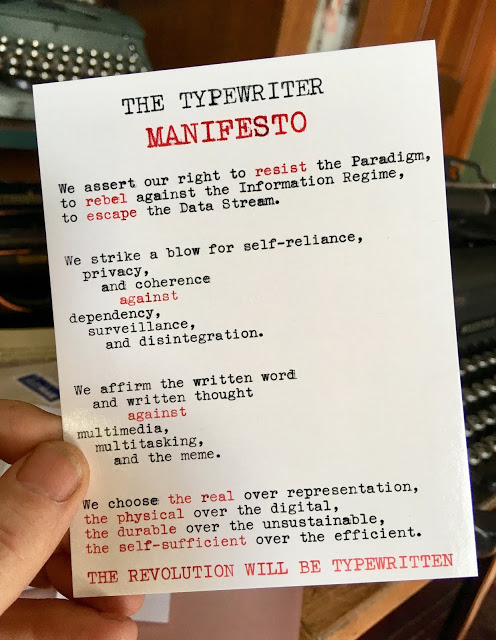
- Visit Richard Polt’s blog at The Typewriter Revolution.
- Writers take note! See also his call for submissions for the next Loose Dog Press anthology, Margin Releases: Typewritten Tales of Transgression. Deadline: March 1, 2022.
I welcome your courteous comments which, should you feel so moved, you can email to me here.

From the Typosphere: “Right” and “Wrong”
“The Typewriter Manifesto” by Richard Polt,
Plus Cyberflanerie on Technology
Q & A with Álvaro Santana-Acuña on Writing
Ascent to Glory: How One Hundred Years of Solitude
Was Written and Became a Global Classic



